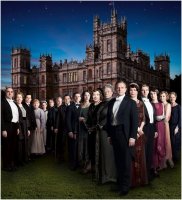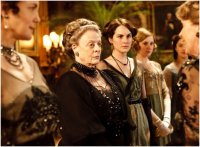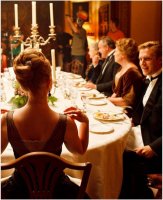Why writers should love Downton Abbey
 Well, perhaps in all honesty, I should entitle this post: Why this writer loves Downton Abbey.
Well, perhaps in all honesty, I should entitle this post: Why this writer loves Downton Abbey.
Still, I see it’s become something of a trend recently. The Writer this month features the British period miniseries Downton Abbey on its cover, entitled “True to the Period” and the excellent Nathan Bransford blog had a recent post What writers can learn from Downton Abbey.
Is it true? Can I justify my frightening obsession with British, multi-part period dramas not as a mere time-waster, but as a valuable learning experience? No way am I letting this opportunity pass me by. Me? Lazy in front of the TV? Heavens no! It’s research.
The Writer interviews the show’s creator and sole writer, Julian Fellowes, who talks about his writing process for the screenplays and the multiple revisions each script undergoes after producers, executives, actors, etc. etc. all weigh in. Fellowes has also written two novels, and he says novelists don’t realize how easy they have it, with only a novelist and editor collaborating on changes, rather than a cast of seemingly thousands.
 Anyone who has seen Downton Abbey knows that the writer skilfully juggles multiple story lines and characters, a talent any writer will appreciate. I’m constantly struggling with this in my own work, so I marvel at how effortlessly this is done in the show. And I know that it must require a tremendous amount of hard work and careful planning behind the scenes.
Anyone who has seen Downton Abbey knows that the writer skilfully juggles multiple story lines and characters, a talent any writer will appreciate. I’m constantly struggling with this in my own work, so I marvel at how effortlessly this is done in the show. And I know that it must require a tremendous amount of hard work and careful planning behind the scenes.
In Downton Abbey, Fellowes manages to fully immerse his viewers in early 20th century life on an English Manor. The series opens in 1912, follows through World War I and the third season plays out in post-war England.
In his interview, I like how Fellowes points out that although you can write about situations or controversies that would not have been formally acknowledged at the time, you must have your characters react in a believable way for that era.
 My undergraduate degree was in history and I was studying it at the height of the political correctness movement. It drove me crazy when some professors or – more commonly – graduate student teaching assistants wanted us to study history exclusively through the prism of revisionist eyes, making PC judgments about decisions made or opinions held on the basis of contemporary thinking.
My undergraduate degree was in history and I was studying it at the height of the political correctness movement. It drove me crazy when some professors or – more commonly – graduate student teaching assistants wanted us to study history exclusively through the prism of revisionist eyes, making PC judgments about decisions made or opinions held on the basis of contemporary thinking.
I resisted it then and I resist it now in my literature. I’ve read many a historical novel that’s been ruined for me because the logic simply doesn’t make sense for the time period and I can’t suspend disbelief that a protagonist would have reacted in such a way at the time in which the story is set.
Like Fellowes, I believe it is truly important that a writer of historical fiction to fully understand the period and the beliefs of his or her chosen era.
Writers will also appreciate Fellowes’ advice that tenacity is the most important key to success. Keep improving on your work, keep writing, and be sure to not give up in the face of rejection. He also cautions about giving up too much of your style or voice to mimic others who have been successful.
Excellent words of advice for writers from the creator of the wildly successful Downton Abbey. Now if only I could write lines as brilliant as the ones he creates for Maggie Smith’s character.
What about you, writers? Any fellow Downton Abbey addicts out there?
Me, me! I have to admit that it took me awhile to start caring about the characters (and thus getting into the show), but once I got to know them, I became hooked.
Thanks for the comment! Glad to know the show hooked you, too.
Great post! I can relate to your self-justifications of “I’m not wasting time…it’s research!” 🙂 I agree that this show offers excellent lessons in writing. The fact that when I talk to friends and other Downton fans we find ourselves discussing the characters as though they are REAL people is a sign of great characterization!
Thanks, Ashlee. Glad to know I’m not the only one shamelessly ready to ‘research’ when my favorite period dramas are on. : ) I would like to work on a multi-narrator project, so it is interesting to see how nicely the story threads flow into one another. Good luck with your *research*!
I have to confess I’ve never watched it! Our tv is in the attic where there is no heating so I’m really reluctant to go up there and freeze.
I’ve toyed with the idea of writing an historical novel set in my area and I think it would be extremely challenging to write something authentic. Much easier to write with today’s mindset!
Hi Catherine! That’s actually a smart move to place the TV in an unappealing (and freezing) part of the home. I think TV was one of the first things I gave up when I started writing (not much of a sacrifice, to be honest). But I do cave for these period dramas and often feel I’m a real financial supporter of BBC, with all the period dramas I purchase. Slightly more appealing than Italian television? : )
Interesting post. It is important to understand the beliefs of the historical period we are analyzing. Good point, Kimberly. It is also important to know how we can improve the present based on past mistakes in history. History should be the starting point to understand our present.
Thanks, Julia. Well, trying to get into a mindset from the time is part of the fun in studying a period. I agree from you that we should learn from mistakes in history. I’m just not convinced it happens as much as it should. : (
I’m totally addicted to Downton and take off my hat to anybody who writes quality historical fiction. I tried it myself last year and it’s not easy, but I could see how addictive it would be – the full immersion in a past world.
Haha! You, too, Grace? I read in the interview with the writer that he had also written the screenplay for the BBC ‘Vanity Fair’ that I absolutely loved (the Hollywood version convinced me less). So he does 19th century well, too.
I’m a total Downton addict! The Christmas one was disappointing though, won’t tell you why as it’s a major spoiler.
Julian Fellowes apparently grew up between an upstairs and a downstairs class family so knows what both groups well.
Reblogged this on Amsterdam Oriole and commented:
A post about one of my favourite TV progs and its creator Julian Fellowes. Thanks, Kimberley for a great blog!
Thanks so much for reblogging, Susan! Glad to see Downton addicts – I mean, fans – are scattered all over the world. Thanks, too, for keeping mum on the Christmas special. The DVD is arriving in the mail as I write… : )
I’m an addict too Angela and I totally agree on the brilliance of Maggie Smith’s lines (and her portrayal of the Dowager countess). On the accuracy of the time period, I simply do not know, but I love the storylines and just cannot resist watching!
Thanks, Jetteke. So nice to see so many fans. Yes, I don’t think I could manage pulling together so many storylines, so I love to see how it’s done. And I just love Maggie Smith’s Dowager countess. Of course, I love Maggie Smith in everything, but this must be a fun role for her.
I would be an addict if we got UK TV here but we made a decision not to when we moved to France 16 years ago. Probably a mistake because people are always saying, “Did you see…?” And Downton Abbey is no exception. Will have to get the DVD version.
Hi Nessa. I don’t get any non-Italian channels here either, so I have to buy the DVDs… but it’s well worth it. Hop you’ll get ‘hooked’ , too.
What I appreciate most about the show is its attention to historical accuracy.
I agree. They really manage to get this right.
I don’t write historical but I do love history so I’m hooked! And Highclere Castle is now on my Bucket List. I’ve only seen the first season on DVD but I’m looking forward to a Season 2 marathon over the summer.